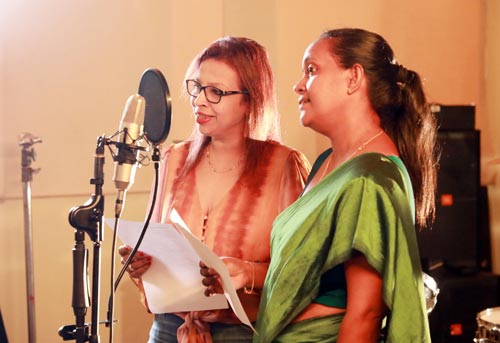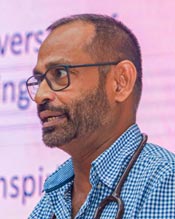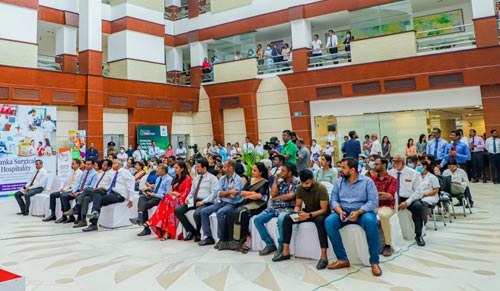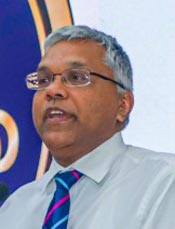A song of hope marks a milestone of this Blood Cancer Centre

Recording of ‘Harmony of Survival’
Faces in the audience and similar faces on the screen – smilingly raising their voices in song in a bid to dispel the misconception that cancer is a death sentence……….giving hope in a situation that many feel is one of utter hopelessness.
The melody and lyrics of ‘Anduru walakulu atharin hinahenna’ fills the atrium of Lanka Hospitals at Narahenpita on October 12, while patients go hither and thither seeing doctors.
For those seated in the atrium it is a celebration of life on the theme ‘Harmony of Survival’ which is also marking the 10th anniversary of the Lanka Hospitals’ Blood Cancer Centre, with the launch of this inspiring song sung by survivors.
Dubbed by one and all as the “driving force” behind the Blood Cancer Centre, Dr. Saman Hewamana, provides powerful data on survival rates.
While blood cancers including leukaemia, lymphoma and myeloma are common to both males and females, most are treatable and some curable, it is learnt. However, cultural and societal norms in Sri Lanka often lead patients to conceal their illness.
Consultant in Clinical Haematology Dr. Hewamana talks of three studies done by him and his team on Hodgkin Lymphoma; Acute Myeloid Leukaemia (AML) and Multiple Myeloma.

Dr. Saman Hewamana
The Hodgkin Lymphoma study had been published in the prestigious Lancet group of publications and the Acute Myeloid Leukaemia study in the journal of the British Society of Haematology respectively in 2021; and the Multiple Myeloma study in JCO Global Oncology, a journal of the American Society of Clinical Oncology in 2022.
Reiterating that Hodgkin Lymphoma can be “cured” using western treatment protocols, Dr. Hewamana tells the Sunday Times that even though someone around the world is diagnosed with a ‘blood cancer’ every 35 seconds, they have the best chance of survival if they are diagnosed on time and treated with appropriate medicine. Hodgkin Lymphoma is the commonest blood cancer type in young adults.
He regrets that some patients in Sri Lanka present themselves when the disease is at an advanced stage, while others, mainly females, decide not to continue treatment.
However, the good news is that 86% of patients who continued treatment at the Blood Cancer Centre showed a “complete response” – complete disappearance of the cancer, said Dr. Hewamana, explaining that the study covered the period 2013-2021 and also compared these results with those in western countries.
Moving onto Acute Myeloid Leukaemia, he said that it is almost always fatal without treatment, with survival ranging from a few days to weeks. Patients who continued treatment showed a five-year estimated survival rate of 62.9%. This was after he and his team compared outcomes between patients who continued treatment and patients who decided not to do so between 2013 and 2020.

The audience at the celebration in the atrium
Referring to Multiple Myeloma, the second commonest haematological malignancy, which accounts for 15%-20% of cases, Dr. Hewamana says that though the incidence has increased over time, the death rate has fallen because of improvement in polychemotherapy and radiotherapy. Patients mostly present with anaemia, bone damage and kidney problems. Among the participants in their study, 81% had presented with bone disease and 72% with anaemia.
“We compared outcomes between patients who continued treatment at the Blood Cancer Centre and patients treated in clinical trials in high-income countries. Our patients showed a response rate of 97% and a five-year estimated survival rate of 65%,” said Dr. Hewamana.
These treatment successes are likely due to uniform treatment protocols, having a full-time in-house clinical haematologist/haemato-oncologists, following western protocols to treat patients and treatment-related complications and having comprehensive supportive care, it is understood.

CEO Deepthi Lokuarachchi
The Blood Cancer Centre has been established in the self-financing Lanka Hospitals in collaboration with colleagues in government subsidised hospitals. There is designated space, staff and a strategy to treat blood cancers using treatment protocols from the United Kingdom (UK). The centre has also been used for training of the first haemato-oncology post-graduate trainees from government-subsidized hospitals.
In the audience on October 12 was 64-year-old Sakunthala who had been told categorically at a different hospital in the initial stages of her illness that she did not have cancer. She had been instructed to have blood transfusions as her haemoglobin levels (an iron-rich protein in red blood cells that helps transport oxygen throughout the body) were low and she had done just that. She is fearful of thinking of what would have happened if she continued down that pathway, for she did have blood cancer.
“I fell into the right track of treatment only after coming under the care of Dr. Hewamana,” says Sakunthala simply.
Among the speakers at the event were the Group Chief Executive Officer of Lanka Hospitals PLC, Deepthi Lokuarachchi and the Deputy Chief Executive Officer/Director Medical Services, Dr. Lasantha Karunasekara.
Searching for an ideal partner? Find your soul mate on Hitad.lk, Sri Lanka's favourite marriage proposals page. With Hitad.lk matrimonial advertisements you have access to thousands of ads from potential suitors who are looking for someone just like you.


